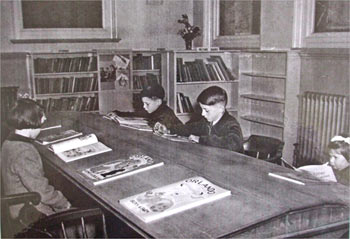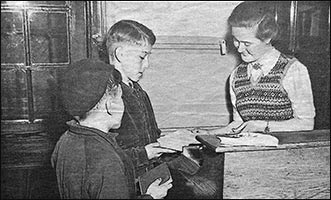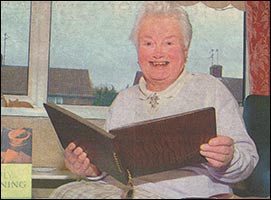|
Extract from Council Meeting August 1919
Pensioners— Mr. Perkins referred to the use of the Free Library by the Pensions Officer, and said it was rather depressing to see so many people waiting their turn in the lobby, without a room in which to sit down. He proposed that the librarian be requested to place at the disposal of the officer and the people on Tuesday and Wednesday evenings the small “reference room.” Mr. Tomlin seconded, and it was carried.
|
Extract from "Wartime" 14th November, 1941
More Reading
The Librarian (Miss M. Perkins) reported that 25,734 books were issued in the September quarter – an increase of 4,271 compared with the third quarter of 1940.
Membership was 4,850 (an increase of 225 since June). New books numbered 647 and cost £130, in addition to which 44 had been presented, 29 of these being from the library of the late Miss Mary L. Pendered.
Library hours for the issue of books were now : Mornings 10 to 12.30, afternoons (except Thursday) 3 to 7.
Mrs. Muxlow noted that the membership included 664 evacuees.
|
The Rushden Echo and Argus, 27th July, 1951, transcribed by Gill Hollis
New Books at Your Service - Rushden Library issues first catalogue
The keener users of Rushden Public Library will appreciate the latest facility there — a catalogue listing recent additions to the stocks of the Lending Department.
'What's New?' or Catalogue No. 1, has been prepared by the librarian (Mr. C. H. Ray) as an experiment. Fifty copies have been duplicated and are available to interested members of the library. A few had been circulated to groups, and Mr. Ray is confident that the service will become permanent. He hopes to issue further lists every two or three months as the stock is replenished.
About a hundred non-fictional works are named along with a selection from the works of fiction.
Travel in other lands is well covered, but not at the expense of the home territory, for guide books and less utilitarian volumes cover much of the scene in Britain — anything from the East Midlands to the islands round our shores. Most timely, no doubt, is Grace Golden's 'œOld Bankside,' giving the history of the South Bank Exhibition site.
Hobbies
Books on hobbies embrace railways, dog breeding, antiques, bookcraft, bee-keeping, camping and photography. Five volumes examine world affairs and five balance-up for sport with Moss Deyong and Maurice Tate in the personal limelight.
For those who may wish to study duodenal ulcers or headaches the means are at hand. Others may prefer murder and marriage — in separate volumes — scientific revelations (including relativity and genetics) or electric clocks — about which it should not be difficult to write a book in these days of power cuts.
William Cowper figures in a good range of literary subjects; 'The Great Escape' and four other books arise from the Second World War; psychical research is found under 'Religion.'
Biographies include 'Green Shadows,' the latest 'œlife' of John Clare, the Northamptonshire poet. There is a book on the Crystal Palace Exhibition of 1851, and musicians will note the new collections of miniature scores and piano-forte music.
|
Rushden Echo and Argus, 24th October, 1952, transcribed by Jim Hollis
Eleven hundred children’s books
Miss Sheila Thake, junior librarian at Rushden, received a book from nine-year-old Ian Crowdy on Wednesday afternoon and then stamped and handed him the first book to be taken out of the new junior library, which had been opened a few minutes earlier.
 |
|
Picture books and magazine annuals are set out for reading in the new junior library at Rushden which was opened on Wednesday afternoon. The first “customers” who made use of the literature were Valerie Hales (9), Paul Tompkins (9), and Ian Crowdy (8).
|
The opening ceremony was performed by Coun. Mrs. A. U. Muxlow, chairman of the Library Committee, who was introduced by the chairman of Rushden Urban Council, Coun. J. Allen.
Mrs. Muxlow said that the first junior library was opened in the town in 1942 and had 150 members. Now there were four times as many readers and they had merited a new room. This room, once the reading room of the public library, has been redecorated, with new bookshelves painted eau-de-nil, and cream walls, and 200 new books have been bought, bringing the total number to 1,100.
Story and picture books, travel, legends, nature and arts and crafts, together with reference books are all clearly labelled in neat rows, and there are special books set out on a table in the centre of the room which the children can sit down and read.
Others who attended the opening were Mr. C. H. Ray (librarian) and Mrs. Ray, Couns. H. Waring and E. A. Sugars and Mr. A. J. Crowdy (Clerk to the Council), Mr. A. Millar (Surveyor) and Mr. Walter Tarry.
|
The Rushden Echo, 6th July 1962, transcribed by Jim Hollis
Libraries’ Book Issues a Record
During the past year Rushden library and Higham Ferrers library issued more books than ever before.
At Rushden 166,175 books were issued, an increase of 10,547, and at Higham Ferrers 21,288, an increase of 546.
The main reason for the rise at Higham Ferrers is attributed to the innovation introduced this year allowing members to borrow three books instead of two. The addition of 600 new books to the library’s existing stock is also thought to be partly responsible.
Membership
Another factor is increased membership. Sixty-six adults and 44 children became members, while only 31 memberships were cancelled. Total membership now stands at 698, which is 126 more than two year ago.
The number of adult books issued was 14,817, which is 442 more than the previous year. There were 6,471 junior books issued, a drop of 104.
Adults
Mr. J. S. English, Rushden’s librarian, who will be leaving the town later this year, noted: “The increase was all in the adult library, and there was a somewhat disappointing drop in number of junior books borrowed; this was paralleled by a small decrease in the number of junior borrowers, but again this was more than offset by the increased number of adult readers.”
Adult issues totalled 129,887 and junior 36,288. Of the total just over 90.000 were adult fiction issues.
The daily average of books issued throughout the year was 539.
Cost
Membership of Rushden’s library has risen, too. On March 31, 1961, the figure was 4,040 and at the same time this year it had risen by more than 150 to 4,195.
The cost of the 3,121 new books purchased during the year was £2,155 1s 9d, which included £5 2s 3d from fees for lost and damaged books. Expenditure on books amounted to 2s 6d per head of population.
There are now 26,516 books in the library.
Requests for books at Rushden were slightly higher, but at Higham Ferrers there was a decrease.
|
The Rushden Echo, 27th July 1962, transcribed by Jim Hollis
Rushden Librarian to Leave
The Rushden librarian, Mr. James A. English, is to leave his post at Rushden on Tuesday to work as librarian at the Gainsborough Public Library.
Mr. English is to take up his position at Gainsborough on August 6.
He is married and has two children, a daughter, Gillian, aged 8, and a son, John, aged 3. They live at 3 Short Stocks, Rushden.
Mr. English has been at Rushden for five years. He began his career at the North Riding County Library, and then went to Ilkeston, Derbyshire, where he was chief assistant librarian from 1953-57.
|
The Rushden Echo, 17th January 1969, transcribed by Jim Hollis
Old notes found to replace Rushden’s missing manuscript?
What has happened to Rushden’s missing manuscript? It sounds like the title for a Sexton Blake 1d.novel, but the missing manuscript is of considerable importance to those interested in the history of the town.
However, all is not lost even if the original manuscript has been accidentally destroyed. Mr. and Mrs. Gerald Coe, who are booksellers, of Pilgrim Cottage, Wilbarston, have uncovered some copious notes on Rushden, written by Mr. Joseph Enos Smith.
Mr. Smith was a well-known Rushden personality during the early part of this century and was, for many years, organist at St. Mary’s Church.
“We cannot remember where we got these notes from now or how long we have had them,” Mrs. Coe said. “But when checking over our stock and we ‘discovered’ them we realised that they could be of great interest to anybody interested in writing a history of Rushden.”
Inquiries made by Mr. and Mrs. Coe showed that at one time there was a manuscript in existence, but nobody seems to know where it is now.
I checked with Rushden librarian, Miss R. L. Armsby, and she said she understood a manuscript on the history of Rushden has been written by Mr. Smith. For a time – before she became librarian – it was in Rushden library. But it was loaned out to a student and has never been returned to the library. “I understand that originally the manuscript was left to the Rector of Rushden St. Mary’s Church and that is where it was returned,” Miss Armsby said.
However, she did add that she could not say whether or not the manuscript bore any relationship to the notes now in the possession of Mr. and Mrs. Coe. Unfortunately I could not check with the Rector of Rushden. The former rector has left the town and the newly appointed one, the Rev. A. M. S. Wilson, has yet to take up residence.
In the meantime Mr. and Mrs. Coe are still wondering how important the old notes they have could prove to be. “If the original manuscript is still in existence and was produced from these notes then they are of little use,” Mr. Coe said. “But if the original has been lost these notes could be the only things left to reproduce another one.” Mr. and Mrs. Coe admitted that they were not interested in selling the notes.
“There are between 100 and 150 foolscap pages of handwritten notes here. They include extracts from periodicals and magazines of the time, a register of births, marriages and deaths, public houses and what have you,” they said.
I took a brief look at some of the notes and I noticed that one extract was dated 1339, so they seem to be fairly comprehensive.
Mr. and Mrs. Coe said they would be interested in hearing from anybody who was prepared to go through the notes in great detail and produce a manuscript from them. If the manuscript was of general interest and an accurate history of the town they would be prepared to publish it.
There is no doubt that a published history of the town would be of importance. Miss Armsby told me that there was no comprehensive history of Rushden in book form in existence.
Already Mr. and Mrs. Coe have received inquiries from Rushden Amenities Society who might be interested in producing a manuscript from the notes.
They also received a call from an elderly Rushden woman who can remember being with Mr. Smith when he wrote some of the notes.
However, I would suggest that a serious attempt is made to locate the original manuscript before a decision is taken. If it is still in existence and is related to the notes it could save somebody a great deal of tiring work.
|
The Rushden Echo, 24th January 1969, transcribed by Jim Hollis
Riddle of historical document cleared up
The mystery of the missing Rushden manuscript has been solved. In fact there was never any real mystery at all. The manuscript has never been missing and there is no secrecy about it.
The manuscript, which deals with various aspects of Rushden’s history written by Mr. Joseph Enos Smith, is in the safe possession of Dr. B. W. Paine, of Higham Ferrers, whose is acting as custodian of it until the new Rector of Rushden, the Rev. A. M. S. Wilson, takes up his new appointment.
The question of the manuscript’s whereabouts was raised in the “Rushden Echo” last week after Mr. and Mrs. Gerald Coe of Pilgrim Cottage, Wilbarston, discovered some of the original notes made by Mr. Smith.
It was felt these notes could be of great importance if the manuscript, which was known to be in existence at one time, was missing.
The manuscript is not missing. Dr. Paine explained how he came to have it in his possession.
“Originally the manuscript was left to the Rector of the town. However, the Rev. Douglas Jones, rector at the time, felt it should be given to the county archivist.
“He refused to accept the manuscript unless it was indexed. My daughter, a local historian, volunteered to take the job on.
Cuttings
“Then she married and I decided to take over from her. At the moment I am just about halfway through,” he said.
The manuscript contains copies of letters, cuttings and documents relating to the history of the town but is not in book form.
“There are very wide gaps. That is why it needs indexing. There is too much of some things and too little of others. To put it in book form would still require a great deal of time and additional research,” Dr. Paine said. However, he did stress that the manuscript did cover a great deal of information.
After last week’s “Echo” comments on the discovery of the rough notes and the possibility that the original manuscript might be missing, we received several calls from people who could remember the manuscript. In fact one inquiry came from a former Rushden woman, Mrs. Barbara Hake, who now lives in Lincoln. Mrs. Hake (nee Catlin), whose mother still lives at 16 Oswald Road, Rushden, wrote enclosing a cutting from the “Echo” of January 9, 1948. This showed Barbara at Rushden library, looking through the manuscript.
“Mr. Smith, who was organist and choirmaster at St. Mary’s Church for many years, spent something like five years between 1907 and 1911 writing the notes for the manuscript. His travels in search of information included visits to Peterborough, Northampton and even London,” Dr. Paine said.
The rough notes discovered by Mr. and Mrs. Coe are now in the possession of Mr. Clive Wood, secretary of Rushden Amenities Society.
Promise
He visited Dr. Paine but explained he could not show the rough notes he had to anybody because he had promised not to.
However, an “Echo” reporter who saw some of these rough notes noticed that some had “copied into book” written on them.
This seems to indicate that the rough notes are part of the notes on which the manuscript Dr. Paine has is based.
Dr. Paine explained that there was no mystery or secrecy about the manuscript he has. He is only keeping it until the new rector arrives. He will be able to decide whether to continue the indexing, hand them over to the archivist or to keep them.
Quality
In the meantime Dr. Paine said he is willing to let anybody who was interested look at the manuscript.
Mr. John Slee, publicity officer of the Amenities Society, said Mr. Wood, a keen amateur antiquarian, plans to type out the rough notes he has to assess their quality and to see what could be made of them. The notes would then be returned to Mr. and Mrs. Coe.
One would think the present manuscript could save him a great deal of time and trouble.
Note: Dr Paine's notes and Mr J E Smith's note books now deposited at Northamptonshire Record Office. NRO Ref: 285P/272-301
Hearts & Soles has extracted information from these books, including a page of miscellaneous "Interesting Notes".
|
| Evening Telegraph, 6th December 2005, article by Catherine Collins |
Librarian recalls the early years
THE first children's librarian at Rushden Library has shared her memories of the historic building as it celebrates its centenary year.
Sheila Rice, 72, of Allen Road, Rushden, joined the library in 1950 at the age of 17.
She said: "We used to work long hours for very little money but we had plenty of prestige and I really enjoyed working there. You felt as though you were an important part of the community. You couldn't walk in town without someone recognising you."
The highlight of the five years she spent at the library was becoming its first children's librarian at the beginning of the 1950s.
 |
 |
|
Sheila on the first day of the junior library in 1950
|
Sheila Rice in 2005
|
She said: "My happiest memory is of having my photograph taken with the councillors and members of the library committee who came to open the department. Everyone made a great deal of fuss of me - it was a very special day. We didn't have story times or things like that then but I always did my best to show the children around and help them."
She left in 1955 to have her daughter Diana. Since then she has witnessed the library's modernisation and the introduction of new services such as internet facilities.
She said: "The library has altered a lot since I was there and when I go in I try to work out where everything used to be. But I think the modernisation has been done very tastefully. To me, the library will always have an important role to play - it offers so many services and is a focus for the town."
Rushden Library was founded by industrialist Andrew Carnegie and celebrated its 100th anniversary on November 25.
|
|
|